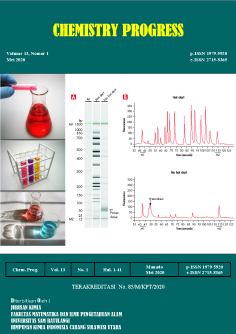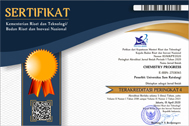AKTIVITAS ANTIINFLAMASI EKSTRAK AIR TEPUNG PELEPAH AREN (Arenga pinnata)
DOI:
https://doi.org/10.35799/cp.13.1.2020.30207Keywords:
pelepah aren, Tikus, karagenin, AntiinflamasiAbstract
Penelitian ini bertujuan untuk menguji aktivitas antiinflamasi dari beberapa dosis ekstrak fraksi air tepung pelepah aren terhadap tikus putih galur wistar (Rattus norvegicus L.) yang diinduksi karagenan berdasarkan nilai persen inhibisi radang. Metode yang digunakan untuk pengujian antiinflamasi adalah dengan induksi karagenin 1% sebanyak 0,5 mL pada telapak kaki belakang hewan uji 1 jam sebelum perlakuan terhadap tikus diberikan secara peroral. Hasil penelitian menunjukkan dosis yang paling bagus dalam menghambat inflamasi yaitu dosis 30% dimana mempunyai nilai persen inhibisi udem lebih tinggi dari kontrol positif (Na-diklofenak). Pada uji Kolmogorov-Smirnov, data persen inhibisi udem pada semua kelompok uji dari jam 1 sampai ke 6 terdistribusi normal (Ï≥ 0.05). Pada uji Homogenitas Levene, data persen inhibisi udem pada semua kelompok uji dari jam 1 sampai ke 6 terdistribusi homogen (Ï≥ 0.05). Pada uji One-way ANOVA, nilai signifikan dari persentase inhibisi udem jam ke-1 sampai jam ke-6 yaitu berbeda secara bermakna (Ï≤0,05). Pada uji BNT (LSD), dosis 30% memiliki nilai signifikan (Ï≤ 0.05). Sedangkan dosis 20% dan 25% tidak memiliki nilai signifikan. Maka dapat disimpulkan bahwa data persen inhibisi udem telapak kaki tikus dengan dosis 30% berbeda secara bermakna.
The present study aimed to discuss the anti-inflammatory activity of several doses of extract of water fraction of palm sugar flour on rats of Wistar (Rattus norvegicus L.) strain induced carrageenan based on percent inhibitory inflammation values. The method used to test anti-inflammatory is by induction of caragenin 1% by 0.5 mL on the soles of the test animal's feet 1 hour before evaluation of rats given orally. The results showed that the best dose against inflammation was the 30% dose which had a higher percent inhibition value than positive control (Na-diclofenac). In the Kolmogorov-Smirnov test, percent data inhibited in all test groups from 1 to 6 hours were normally distributed (Ï≥0.05). In the Levene Homogeneity test, percent inhibition data in all test groups from 1 to 6 hours were homogeneously distributed (Ï≥0.05). In the One-way ANOVA test, the significant value of the percentage of inhibition of the 1st to 6th hour edema was different from the contribution (Ï≤0.05). In the LSD test (LSD), a dose of 30% has a significant value (Ï≤0.05). While the doses of 20% and 25% have no significant value. Then it can be concluded that the percent data inhibits rat foot edema at a dose of 30% significantly different.
Â













